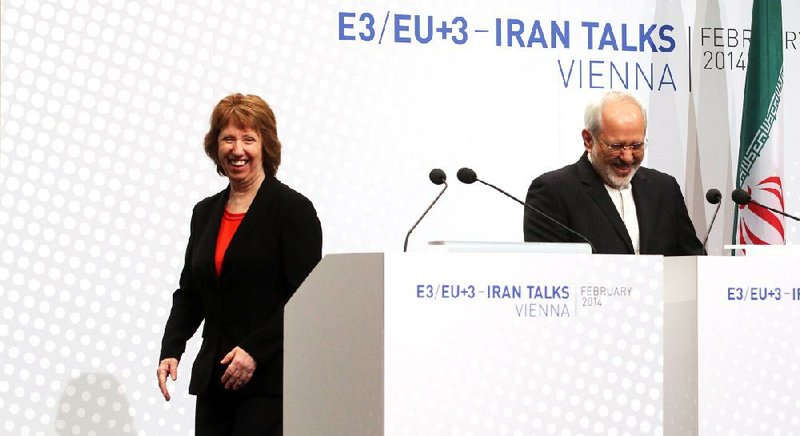VIENNA - In what officials described as a serious, workmanlike and conversational atmosphere, Iran and six world powers agreed on a timetable and framework for negotiating a comprehensive agreement to end the confrontation over Iran’s nuclear program, the European Union’s foreign-policy chief and Iran’s foreign minister said Thursday.
While details were vague and the two delegation leaders declined to take any questions at a closing news conference, they said groups of experts will meet early in March and the full delegations will meet in Vienna again March 17, with the expectation they will meet monthly.
Catherine Ashton, the EU official, said in brief remarks: “We had three very productive days during which we have identified all the issues we need to address to reach a comprehensive and final agreement. There is a lot to do, it won’t be easy, but we have made a good start.”
Officials refused to describe the topics for the expert meetings, but a senior U.S. official, speaking on condition of anonymity under the session’s ground rules, said, “Every issue of concern to us is on the table,” including uranium enrichment, Iran’s heavy-water reactor project and its suspected nuclear military research and ballistic missile program.
The official said all those issues, including clarifying Iran’s past military research, are at least mentioned in a joint plan of action agreed upon with Iran in November in Geneva.
“All our concerns must be met to get an agreement,” said the U.S. official, defining Washington’s goals as ensuring that Iran does not develop a nuclear weapon and that world powers can be confident Iran’s nuclear program has no military aspect or intent, as Iran maintains.
Iranian officials have said publicly that only their nuclear program is on the agenda, not their larger military structure, and they will not dismantle any part of their nuclear program or give up what they have called their right to modernize it. U.S. officials have emphasized that large parts of Iran’s nuclear infrastructure will have to be dismantled, as opposed to simply disabled, as part of a final deal.
A six-month deal to essentially freeze Iran’s nuclear program in return for modest relief from sanctions and the release of some frozen assets expires July 20. The officials said they had planned meetings throughout the next four months, but they wanted to leave the last month free because negotiations tend to accelerate and intensify closer to deadlines.
“This is going to be both a marathon and a sprint at the same time,” the U.S. official said.
The six-month deal can be extended if both sides agree.
The Iranians also suggested that Ashton might make a visit to Iran before the March 17 meeting. Ashton leads the talks for the six world powers: the five permanent members of the U.N. Security Council - the United States, Britain, France, Russia and China - plus Germany.
Western officials and experts concede Iran will have an enrichment program, but they want to constrain and control it to ensure Iran cannot build a nuclear weapon quickly or undetected.
They want some formula that limits the level of enrichment; caps the stockpiles of enriched uranium; dismantles or decommissions a large number of Iran’s centrifuges, machines that enrich uranium; removes the possibility that the heavy-water reactor will produce plutonium; and allows a deeper level of inspections by the International Atomic Energy Agency, which monitors compliance with the Nuclear Nonproliferation Treaty.
Iran, for its part, wants the removal of economic sanctions imposed upon it by the United Nations, the European Union and the United States. At the same time, it wants to preserve its dignity and what it calls its right to enrich uranium and to have a peaceful nuclear program like other signatories to the nonproliferation treaty.
The senior U.S. official cautioned that public statements by all sides made to domestic audiences might inevitably create political difficulties, but that both sides had agreed to try to be “thoughtful” about comments that might hurt the chance of successful negotiations.
The head of the U.S. delegation, Wendy Sherman, was to travel Thursday from Vienna to brief allies in Jerusalem, Saudi Arabia and the United Arab Emirates, while telephoning other allies and key members of the U.S. Congress.
Front Section, Pages 6 on 02/21/2014
